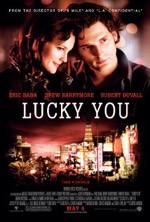Lucky You (PG-13)

Starring: Eric Bana
May 2007
“Bana and Barrymore Are a Winning Pair”
Movies that try to create an epoxy out of disparate story elements (like Treasure Planet’s pirates in space conceit) typically fail to bond either because the elements aren’t complimentary or because spectators would enjoy seeing a film about one or the other, but not both together. In Lucky You, director Curtis Hanson—along with a star-studded cast including Eric Bana, Drew Barrymore, Robert Duvall and Debra Messing—has defied the odds with his surprisingly robust romantic drama that revolves around poker.
Huck Cheaver (Bana) is a fast-living, thrill-seeking poker addict, who lives life on the edge and lets the chips fall where they may. Estranged from his father, L.C. (Duvall), Huck has refined the art of smooth-talking, especially with women, but his lack of commitment coupled with his gambling habit has relegated him to a life of loneliness in his Spartan house, which boasts a high-end entertainment system but has less furniture than a motel room.
The movie’s romantic leads first meet when Huck rescues Billie (Barrymore) from a sleazy schmoozer. Huck soon learns that Billie is the younger sister of one of his acquaintances, Suzanne (Messing). Despite Suzanne’s warnings, Billie becomes involved with Huck, but it doesn’t take her long to discover Huck’s score: Hustle = 10, Commitment = 0. As someone who doesn’t fall for his patented spiel, Billie challenges Huck with, “You say whatever you want people to hear.” As Huck’s feelings for Billie intensify, he finds himself at a crossroads; his budding relationship now stands in direct opposition to his dream of competing in the World Series of Poker.
For some, Lucky You will feel like a feature-length version of a TV poker tournament; others will see the film as an extended seminar on the finer points of Texas Hold ‘Em poker. However, there’s more here than just a high-stakes card game. The movie is extremely instructional at revealing the gambler’s mentality: the competition and compulsion that compels the gambler to risk it all on a bet (one of Huck’s male acquaintances looses a wager and is made to walk around with false breasts).
Bana and Duvall are a very good father and son pairing and have excellent chemistry—L.C. is a two-time W.S.P. champion and Huck has lived his life in the shadow of his father’s accomplishments—the friction between the two is nearly palpable. There’s an excellent scene where L.C. shows up at the café where Huck and Billie are having breakfast. Billie, feeling awkward about the unexpected intrusion, excuses herself to make a phone call. Father and son engage in a war of words as they play a fast-paced variation of poker. Besides the action onscreen, what makes the scene crackle with intensity is the knowledge that Billie will soon return and find them playing poker. When Billie does return, her reaction—which ranges somewhere between shock and revulsion—reveals the perspective of an outsider who, for the first time, sees the mental illness that inflicts those with a gambling habit.
Duvall, like fine wine, continues improving with age—his performance here is easily the most textured and intricate in the film. Bana and Barrymore are a feasible couple and both shine in their respective roles. Though Barrymore is the beneficiary of some fine dialogue, written by Eric Roth and Hanson, she still holds her own in a role more demanding than her usual teeny-bopper fare. Parts like this just might make a serious actress out of her…time will tell.
The biggest challenge the movie faces is timing, which on the face of it sounds ignorant since timing is crucial to every movie. Texas Hold Em’ reached the height of its popularity, at least on TV, about two years ago. Had the movie been released at that time—or even six months ago so that it could cash in on some of Casino Royale’s success—Lucky You may have stood a better chance of winning big. As things are, Lucky You is a solid hand that plays up to its potential, but unfortunately doesn’t get the best of it.
Rating: 3